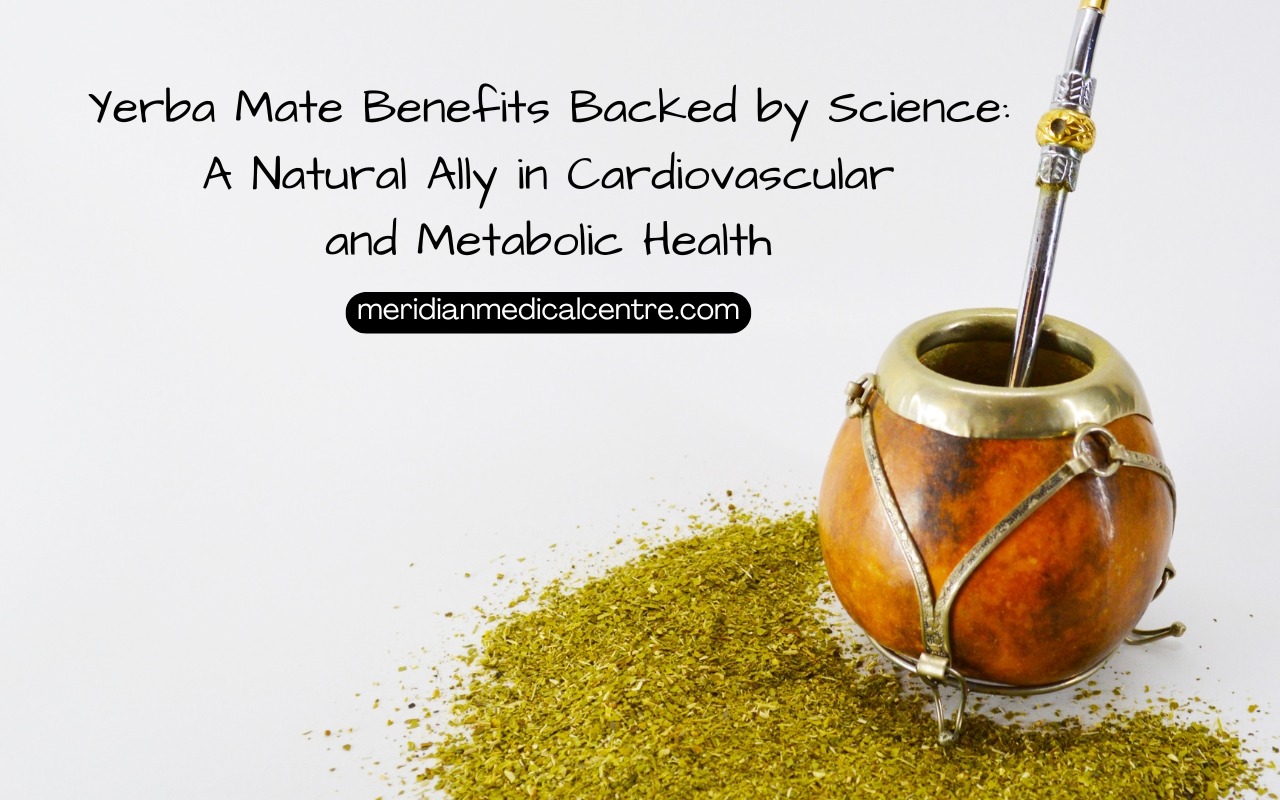
Meridian Medical Centre offers evidence-based wellness content that empowers individuals to make informed health choices. We integrate scientific research and professional expertise to provide balanced insights on how natural products may support overall well-being. While we recognize the role of holistic health solutions, we strongly advocate for consultation with healthcare professionals before adopting new dietary or wellness practices.
Understanding Yerba Mate: Nutritional Profile and Bioactive Compounds
Yerba mate (Ilex paraguariensis) is a traditional South American herbal infusion known for its stimulating properties and potential metabolic health benefits. As global interest in functional beverages grows, yerba mate has gained recognition for its possible role in energy enhancement, cardiovascular health, and weight management. This article examines the scientific evidence supporting these claims, analyzing the bioactive compounds that contribute to its physiological effects.
Key Bioactive Components of Yerba Mate
- Xanthines: Includes caffeine and theobromine, natural stimulants that influence metabolism and cognitive function.
- Caffeoyl Derivatives: Potent antioxidants that may help reduce oxidative stress and inflammation.
- Saponins: Bitter compounds with potential cholesterol-lowering and anti-inflammatory properties.
- Polyphenols: Antioxidants linked to improved heart health and reduced risk of chronic diseases.
Yerba mate also contains trace amounts of essential vitamins (B-complex, vitamin C) and minerals (potassium, manganese, zinc), though these are unlikely to contribute significantly to daily dietary intake.
Yerba Mate and Energy Regulation
Yerba mate is widely consumed for its energizing effects, attributed primarily to its caffeine content.
Cognitive Benefits of Caffeine in Yerba Mate
A standard cup of yerba mate contains approximately 80 mg of caffeine, similar to a serving of coffee. Caffeine is a central nervous system stimulant that enhances alertness by modulating neurotransmitters such as dopamine and adenosine. Unlike coffee, many consumers report that yerba mate provides a smoother energy boost without the jitters, though this effect remains anecdotal.
Metabolic and Weight Management Effects
Yerba mate has been investigated for its potential to support metabolism, fat oxidation, and exercise performance.
1. Potential Enhancement of Physical Performance
A 2021 study in the International Society of Sports Nutrition found that caffeine intake before exercise improved muscle contractions, delayed fatigue, and enhanced endurance. Given yerba mate’s caffeine content, it may offer similar performance-enhancing benefits, though additional research is needed to determine optimal dosages.
2. Effects on Weight Management and Fat Oxidation
Research published in Obesity Reviews (2019) suggests that yerba mate may contribute to reduced fat mass and improved body composition in overweight individuals. The proposed mechanism involves increased energy expenditure and enhanced fat metabolism. However, more large-scale clinical trials are necessary to confirm these findings.
Yerba Mate and Cardiovascular Health
The bioactive compounds in yerba mate may contribute to heart health by modulating lipid profiles and reducing oxidative stress.
1. Blood Sugar and Lipid Regulation
A 2019 study on overweight females found that daily yerba mate consumption led to significant reductions in total cholesterol, LDL (“bad”) cholesterol, and triglycerides over 12 weeks when combined with a calorie-restricted diet. However, some studies report minimal changes in lipid levels, indicating that more research is needed.
2. Cardioprotective Benefits
Polyphenols and caffeoyl derivatives in yerba mate have been linked to reduced inflammation and oxidative stress, both of which play key roles in cardiovascular disease progression. While preliminary data is promising, controlled human studies are necessary to validate these cardioprotective effects.
Potential Risks and Precautions
Despite its benefits, excessive yerba mate consumption has been associated with certain health risks.
1. Cancer Risk and Temperature Considerations
Long-term consumption of very hot yerba mate has been linked to an increased risk of esophageal and respiratory tract cancers. This is due to the presence of polycyclic aromatic hydrocarbons (PAHs)—compounds also found in grilled meats and tobacco smoke. A 2023 review suggests that consuming yerba mate at moderate temperatures may mitigate this risk.
2. Caffeine-Related Side Effects
As a caffeinated beverage, yerba mate can cause:
- Headaches
- Increased heart rate
- Insomnia
- Anxiety or jitteriness
- Gastrointestinal discomfort
Individuals sensitive to caffeine or those with hypertension should moderate their intake.
3. Drug Interactions
Yerba mate may interact with certain medications, including:
- Zanaflex (Tizanidine): A muscle relaxant that can be potentiated by caffeine.
- Luvox (Fluvoxamine): An antidepressant that may amplify caffeine’s stimulant effects.
Patients taking these medications should consult a healthcare provider before consuming yerba mate regularly.
Safe Consumption Guidelines
To maximize benefits while minimizing potential risks, consider the following recommendations:
- Consume at Moderate Temperatures: Avoid drinking yerba mate at excessively hot temperatures to reduce cancer risk.
- Limit Daily Intake: Stick to 1-2 cups per day to prevent caffeine-related side effects.
- Pair with a Balanced Diet: Yerba mate should complement a diet rich in whole foods, lean proteins, and hydration.
- Monitor for Adverse Effects: If experiencing headaches, insomnia, or digestive discomfort, consider reducing intake.
Conclusion: A Balanced Approach to Yerba Mate Consumption
Yerba mate is a nutritionally rich herbal beverage that offers potential benefits for energy regulation, metabolism, and cardiovascular health. While emerging research suggests its role in weight management and lipid regulation, further clinical studies are needed to establish definitive conclusions. Moderate consumption appears safe for most individuals, but excessive intake—especially at high temperatures—has been associated with increased cancer risk and caffeine-related side effects.
At Meridian Medical Centre, we advocate for evidence-based wellness strategies that align with individual health needs. For those considering incorporating yerba mate into their routine, consulting with a healthcare professional is essential, especially for individuals with pre-existing medical conditions or those taking medications that may interact with caffeine.
By making informed decisions grounded in scientific research, consumers can enjoy yerba mate safely while optimizing their health and minimizing risks.